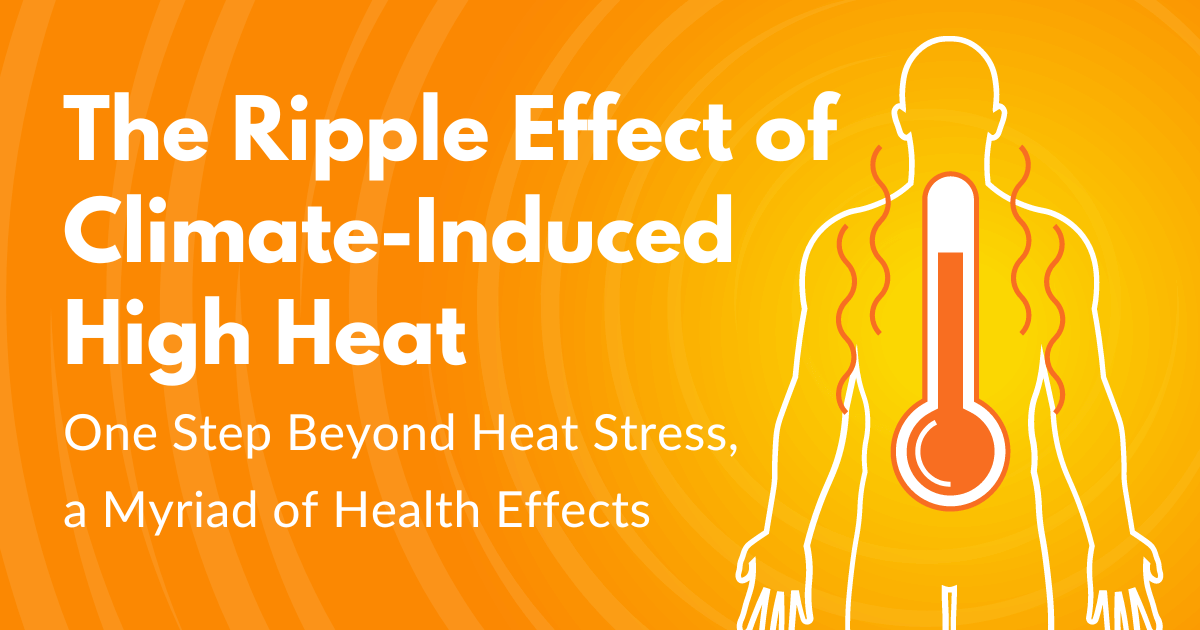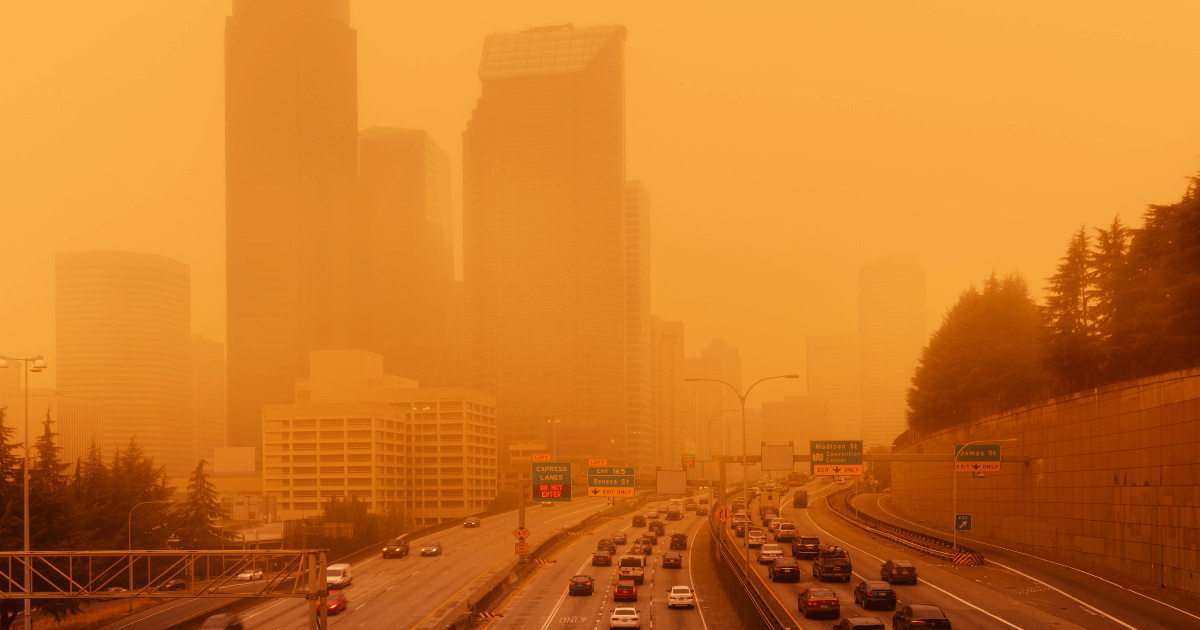The Ripple Effect of Climate-Induced High Heat: One Step Beyond Heat Stress, a Myriad of Health Effects

[Editor’s Note: This is the third installment of our short series on the health impacts of heat. Read the first two articles: It’s Hot, But Do Workers Have to Die? and Supervisor Believed Construction Worker Was on Drugs. He Was Dying of Heat Stress. If you value MCN’s coverage of important issues, our technical assistance, resources, and direct services, please review us on GreatNonprofits.]
Even as this record-breaking hot summer winds down, some parts of the country continue to experience unprecedented high heat days, giving a disturbing preview of climate crisis-fueled summers to come. Heat stress, heat stroke, and other heat-related illnesses are top of mind. Yet, an individual’s susceptibility to heat, and the health conditions heat might provoke, are far wider ranging. Health statuses such as a person’s chronic conditions, age, and medications; the individual’s social determinants including access to a cool location and type of job; and weather cofactors like humidity, air pollution, and the duration of the heat event can each increase one’s risk of illness, hospitalization, and death from heat exposure – and may have compounding effects. Additionally, heat waves drive behavior, increasing isolation, exacerbating issues like food insecurity, and even increasing incidents of violence. At a recent learning collaborative, hosted by Migrant Clinicians Network, the National Association of Community Health Centers, Americares, and Harvard T.H. Chan School of Public Health’s Center for Climate, Health, and the Global Environment (C-Change), the wider implications of heat were laid out by presenter Aaron Bernstein, MD, MPH, former head of Harvard C-Change, current Director for the National Center for Environmental Health and the Agency for Toxic Substances and Disease Registry (NCEH/ATSDR), a pediatrician at Boston Children’s Hospital, and an Assistant Professor of Pediatrics at Harvard Medical School. Here, we break down some of these high-heat co-factors, so that clinicians can better prepare their patients as the climate crisis continues to increase the intensity and duration of heat waves.

Health conditions: People with diabetes, lung conditions like asthma or chronic pulmonary disease, or heart disease can experience a worsening of their conditions due to heat. Mental health disorders may also be exacerbated. (See below.) Higher temperatures may increase the risk of premature labor or low birthweight. This list of conditions that may be affected by high heat is not exhaustive. “Heat is certainly a problem in the absence of chronic disease, when people are for example outside when it’s really hot, working or playing sports, and they can get heat-related illnesses,” said Dr. Bernstein, but “if you have any patients in your clinic with a chronic disease – diabetes, heart disease, dementia, chronic obstructive pulmonary disease, mental health disorders – heat is going to be a problem.” The concern is bidirectional; that is, heat affects chronic conditions, and chronic conditions can affect one’s experience of heat. The CDC notes that people with chronic conditions may be less likely to sense or respond to temperature, and that some of these conditions – heart disease, mental illness, poor blood circulation, and obesity – may increase one’s risk of heat-related illness.

Prescription medication: Patients with medications may be affected by heat in three primary ways.
Medications may degrade in high heat conditions. Naloxone (like Narcan), epinephrine (Epi-pens), insulin, and inhalers are just a few types of common medications that may become less effective after exposure to high heat, and are likely to be exposed to high heat, given patients’ need to carry these medications on their persons or in their cars. This may be a factor to consider for mail-order medications as well.
Some medications increase one’s risk of heat stress. Tricyclic antidepressants (TCAs) may decrease the body’s ability to sweat, its primary function being to cool off the body. Conversely, serotonin reuptake inhibitors (SSRIs) may increase sweating, leading to dehydration. Blood pressure medications, diuretics, ACE inhibitors, antihistamines, anticholinergic drugs, and some psychiatric medications are just a few other categories of medication that may interfere with the body’s internal heat control or affect hydration.
Heat may cause dehydration, which may additionally and adversely affect a medication’s effectiveness.

Air pollution: Outdoor air pollution is estimated to cause between five and 10 percent of annual premature mortality in the US. High heat increases air pollution in several ways. This increase in air pollution, coupled with the stress of high heat, can trigger or exacerbate health conditions.
Heat combined with stagnant air – a frequent problem during some heat waves, for example, when regions of the country experience a high-pressure “heat dome” – increases the development of ground-level ozone, also known as smog.
Extended periods of high heat, particularly in the western United States, dries out vegetation, which substantially increases the risk of wildfire. Particulate matter on its own is dangerous for health. Climate change-induced fires are more frequently threatening buildings and infrastructure. Such fires can be more toxic than wildfires burning through natural landscapes, as structure fires enable the release of toxic and carcinogenic components, like car batteries and foam insulation, into the air.
In combination, these conditions are even more deadly. When high heat and high levels of air pollution combine, the risk of death was about three times higher in one study, than the effect of one of these conditions alone.

Mental health: Heat can affect one’s mental health in several ways. It may directly affect brain functioning, as has been shown on rats. Heat disrupts sleep patterns, which is a risk factor for issues like depression and anxiety. Heat can also increase social isolation as people cancel their engagements to stay safe. There may be other reasons that mental health is affected as well.
Regardless of the mechanism, heat is affecting those with mental health conditions. People with schizophrenia, for example, have difficulty thermoregulating and common medications for the condition cause dehydration. They are more at risk of being unhoused as well. In combination, these factors can be deadly. In one study of a 2021 heat wave in Canada, those with schizophrenia were over 200% more likely to die during the heat wave than in normal conditions.
Other conditions may also be affected. Extreme heat is associated with increased suicides, which is not lessened by access to air conditioning. Depressive language also increases on social media during hotter temperatures.
Violence: Interpersonal violence like homicides, sex offenses, and assault also increase with heat. One researcher determined that, in the US alone, an additional 22,000 murders, one to two million aggravated assaults, and two to three million simple assaults will result from climate change-related heat by the end of the century.

What’s next? As the climate crisis progresses, extreme heat will become more frequent. Clinicians must educate patients, year-round, about how heat can affect their conditions and medications, and brainstorm strategies together to avoid those effects. Additionally, we must share more widely the health impacts of the climate crisis on our patients and communities, and advocate for the quick transformation of our economies – in the health sector and beyond – to slow the climate crisis.
- Inicie sesión para enviar comentarios